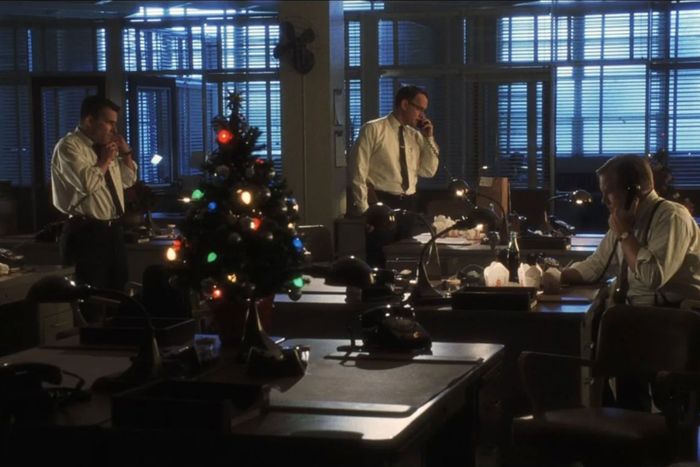
Every holiday season, the same nauseating conversation happens: Is Die Hard a Christmas movie? Yes, it is. (The answer is always yes and has been for decades, no matter what Bruce says.) With that out of the way, we can make room for conversations about other Christmas movies that are not actually Christmas movies, like Batman Returns, Hustlers, The Apartment, and Little Women (1994 — the 2019 version has Christmas in it but is an all-season film). We’d like to humbly add Steven Spielberg’s Catch Me If You Can to this new canon of films that, while not exactly Christmassy in the same way Home Alone is, should be recognized as Christmas movies regardless.
The 2002 adaptation of American criminal/OG scam artist extraordinaire Frank Abagnale Jr.’s autobiography that follows his late teenage years across the globe as a pilot, doctor, and lawyer is a secret Christmas film. Catch Me If You Can stars Leonardo DiCaprio in one of his career-best performances, Tom Hanks with a weird accent (precedent for Elvis), monologue king Christopher Walken, and, of course, Amy Adams with braces. Despite (or perhaps because of?) the director’s detachment from the holiday’s Christian roots — Spielberg is Jewish — Catch Me If You Can is the most accurate representation of Christmas from the adult perspective. In this film, Christmas is a lonely time of reflection, of mourning a past life.
Screenwriter Jeff Nathanson uses Christmas as an emotional anchor. The holiday is both a clever indicator of passing time and, more importantly, a trigger for Frank (DiCaprio). The first of many scenes set at Christmas happens early in the film, when 17-year-old Frank is living a happy life in a beautiful house with his very in-love parents: the American Dream of the ’50s. A naïve young Frank is the happiest he will ever be watching his parents dance in the living room in front of the Christmas tree, completely ignorant of the fact that this is the last happy Christmas he’ll ever have, and the last happy moment his family will ever have.
From then on, Christmas connects Frank and FBI agent Carl Hanratty (Hanks). Every Christmas Eve, Frank and Carl have a tense phone call. Frank is somewhere in the world alone, without a family to celebrate, without a soul who really knows him besides Carl. Carl, divorced and growing further and further apart from his daughter every year, is alone in his office, with a sad little Christmas tree sitting on a desk. These Christmas Eve calls build Frank and Carl’s relationship: Frank’s vulnerability and pain help Carl see him as something more than a criminal. He’s not trotting the globe posing as a pilot and cashing fake checks just because he can — he’s doing it because he’s lonely and wants attention. When Frank is arrested in picturesque France, a choir singing “O Come All Ye Faithful” in Latin clashes with the sounds of sirens.
Choirs singing carols that echo through a square illuminated by twinkle lights while Frank gets caught by the wrong people is a juxtaposition that Spielberg plays with expertly throughout the movie’s Christmas scenes. Catch Me If You Can represents the holiday as a melancholy period. By making Christmas the backdrop for devastating events involving tragic people, it’s become the most Christmas movie of them all, Christmas films and non-Christmas movies included. You might be surrounded by picturesque twinkling lights and tinsel, carols ringing in your ears, but feel more alone and more hopeless than ever.
After Frank escapes arrest via an airplane toilet toward the end of the film, he visits his mother, who now has a new, bigger, more beautiful house and a new family, including a daughter. Nat King Cole’s “The Christmas Song” plays as Frank learns his mother has all but forgotten him: He’ll never get back to that moment of watching his parents dance in the living room. Frank stands in the snow as the flashing blue-and-red police cars overtake the glow of colorful holiday lights.

